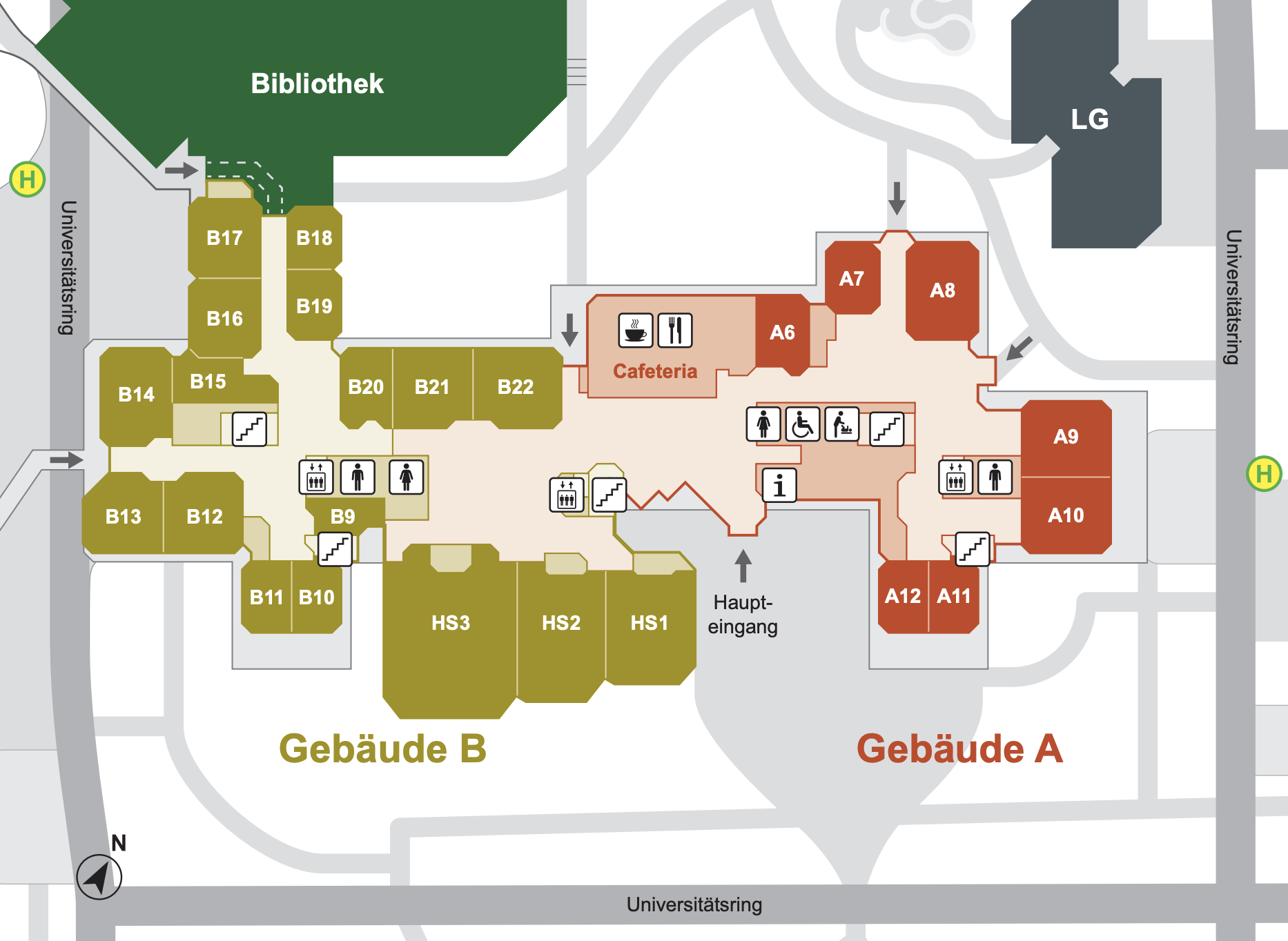Program
Proceedings
The ISSEP Springer proceedings (Lecture Notes in Computer Science, vol.~15958, doi:10.1007/978-3-032-01222-7) are available here
and contain 13 full papers presented at the conference. The ISSEP Local proceedings (doi:10.5281/zenodo.16947554) are available here
and contain additional 4 papers, along with descriptions of keynotes, workshops, and posters presented at the conference.
Until October 8th, you can download the Springer proceedings via this this link
Sunday (7th September) - Doctoral Consortium
Monday (8th September)
| Time |
Event |
| 08:00 - 08:45 |
Registration (Foyer of building A/B) |
| 08:45 - 09:00 |
Official welcoming (HS1) |
| 09:00 - 10:00 |
Keynote: Tobias Kohn, KIT |
| 10:00 - 10:30 |
Coffee break |
| 10:30 - 12:00 |
Session 1: Curricula and Computer Science Concepts (Chair Nataša Grgurina)
-
New Standards for Lower Secondary Education in Informatics in Germany
Lutz Hellmig, Luisa Gebhardt, André Greubel, Martin Hennecke, Tilman Michaeli, Arno Pasternak, Hermann Puhlmann, Gerhard Röhner, Michael T. Rücker
-
Optimising Programming Curriculum Gradation Using the Program Builds Count Method
Václav Dobiáš, Václav Šimandl, Jiří Vaníček
-
Measuring Curriculum Impact through Bebras: The Case for Standalone Informatics Education
Andreas Bollin, Stefan Pasterk, Corinna Mößlacher, Nina Angela Lobnig, Markus Wieser, Michael Jagoutz
-
Principles of Computers – Model Lessons for Lower Secondary School: Experience Report
Anna Yaghobová, Anna Drobná, Filip Děchtěrenko, Cyril Brom
|
| 12:00 - 13:30 |
Lunch |
| 13:30 - 15:00 |
Workshops |
| 15:00 - 15:30 |
Coffee break |
| 15:30 - 17:00 |
Workshops |
| 17:10 - 18:00 |
Steering Committee Meeting (B12) |
Tuesday (9th September)
| Time |
Event |
| 09:00 - 10:00 |
Keynote: Cynthia Solomon, emerit. MIT |
| 10:00 - 10:30 |
Coffee break |
| 10:30 - 12:30 |
Session 2: AI and Digital Literacy (Chair Andreas Bollin)
-
Assessing AI Literacy Skills: A Systematic Review of Questionnaires with Emphasis on Affective, Behavioral, Cognitive, and Ethical Aspects
Michael Lenke, Nils Klowait, Lea Biere, Carsten Schulte
-
How Aligned Are Humans and Large Language Models in Evaluating Computational Thinking Tasks?
Mohsen Asgari, Linda Mannila, Filip Strömbäck
-
Interested Boys, Self-Efficacious Girls? Gender-Specific Differences in the Subject Digital World
Daniel Unro, Rupert Gehrlein, Andreas Dengel
-
Large Language Models in Secondary Informatics Education: Teachers’ Perspectives
Leonard Busuttil
-
Art Interactive – The Intelligent Museum Guide: A Hands-On Approach to Introducing Key Machine Learning Concepts (Best Presentation)
Erik Marx, Nadine Bergner
|
| 12:30 - 13:30 |
Lunch |
| 13:30 - 15:00 |
Session 3: Programming, Problem Solving, and Computational Thinking (Chair Giovanni Serafini)
-
On the Use of Tracing To Diagnose Misconceptions About Iteration
Gabriele Pozzan, Costanza Padova, Chiara Montuori, Barbara Arfé, Tullio Vardanega
-
A Teaching and Learning Oriented Decomposition of Debugging Subskills Informed by Cognitive Load Theory
Gabriele Pozzan, Andreas Bollin, Tullio Vardanega
-
BeLLE: Exploring the Accuracy of the Task Difficulty Ratings in the Bebras Challenge
Heidi Kaarto, Timi Niemensivu, Valentina Dagiene, Daranee Lehtonen, Mikko-Jussi Laakso, Jo Van Hoof
-
Towards the Educational Reconstruction of Computational Thinking and Making in Pre-Service Kindergarten Teacher Training
Tobias Bahr
|
| 15:00 - 18:00 |
Visit to a winery |
| 18:00 - 18:30 |
Trip to the conference banquet |
| 18:30 - 20:00 |
Conference banquet (Deutschherrenhof) |
Wednesday (10th September)
| Time |
Event |
| 09:00 - 10:00 |
Keynote: Valentina Dagiene, Vilnius University |
| 10:00 - 10:30 |
Coffee break |
| 10:30 - 12:00 |
Poster session
-
From Curricula to Classrooms: Primary School Teachers’ First Experiences and Challenges in Teaching CS
Felix Ziemann, Torsten Brinda
-
Novice Programming Misconceptions in Elementary Education
Monika Mladenović, Žana Žanko
-
Conceptual Models for Teaching Quantum Computing: A Normative Analysis
Daniel Krosse, Alexander Best
-
K-6 Teachers' Wishes and Expectations for Computer Science Training
Eve Tessenow, Alexander Best
-
Engaging Learners through a Physical Computing-Based Chess Escape Room (Best Poster)
Deividas Roščenkovas, Anita Juskeviciene, Gabrielė Stupurienė
-
PyToPseu: Automatic Natural-Language Formulations of Programming Constructs to Avoid Misconceptions
Jean-Philippe Pellet, Patrick Wang
-
Assessing Design Thinking in Computing: Towards an Automated Evaluation of Skills
Snieguolė Bagočienė
-
"Art Heist at the Museum": Data Science Education through Educational Breakouts in an Informatics Teaching and Learning Lab
Kira Klaner, Nils Pancratz
|
| 12:00 - 13:30 |
Lunch |
| 13:30 - 15:00 |
Session 4: Teachers' Perspective (Chair Jean-Philippe Pellet)
-
Method Meets Mindset: A Survey Instrument for Teachers' Beliefs and Self-Efficacy on Social Issues in Secondary Computing Education (Best Paper)
Juliane Sperling, Nils Dyck, Michael T. Rücker
-
Professional Development for Bavarian Computer Science Teachers: Evaluation and Effects on Attitudes towards AI
Mathias Ehmann, Nicole Günzel-Weinkamm, Martin Hennecke, Silvia Joachim
-
Teaching Computational Thinking Through Active Games: Insights from Teacher Training
Taina Lehtimäki, Eddie Costello, Kevin Casey, Rosemary Monahan, Aidan Mooney, Thomas J. Naughton
-
Introducing Early-Stage Informatics Education in Primary Teacher Education
Gia Minh Vo, Marco Kindervater, Nils Pancratz
|
| 15:00 - 15:30 |
Coffee break |
| 15:30 - 16:00 |
Awards, announcements, official ending |
